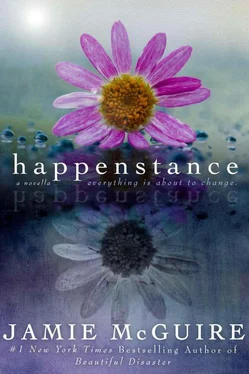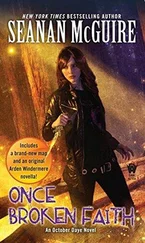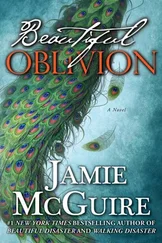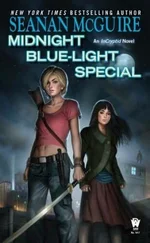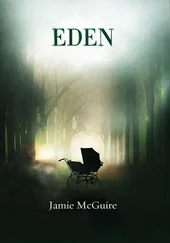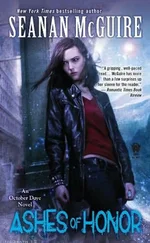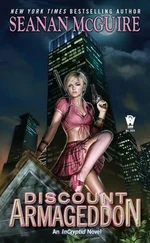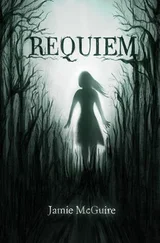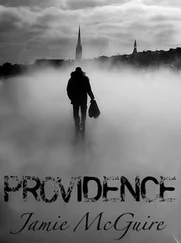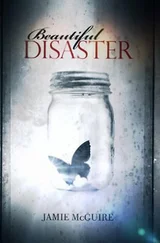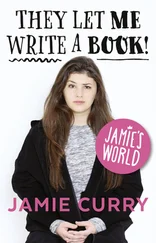Happenstance
Jamie McGuire
“Go home. Turn off the lights. And kill yourself.”
Erin Alderman glowered at me, pure hatred in her beautiful honey brown eyes. She was spearheading a group of nine cheerleaders on the other side of a small, rectangular window. But the glass wasn’t the only thing that separated us.
Nine pairs of eyes danced between each other and me in my black apron splattered with chocolate milkshake and fudge sauce. They were enjoying the show, but not one of them looked directly at me.
Erin Masterson, Erin Alderman’s best friend and co-captain of the cheer squad, was holding the banana split Blizzard I’d just made for her, with vengeance in her eyes. She was as beautifully put together as her best friend, but instead of long, flowing golden hair like her friend, she had long, flowing chestnut hair. “I said with walnuts on top. You have a simple function: put ice cream in a bowl, cup, or cone, and mix ingredients. If you can’t perform a minimum wage job at a Dairy Queen at seventeen years old, how do you expect to operate in your daily adult life? You should give up now, Erin. Die with dignity.”
Erin Masterson wasn’t speaking to her best friend. She was speaking to me, Erin Easter, the third Erin in our senior class. They weren’t always my enemies. In kindergarten and first grade, we tried to spend every waking moment together; our teachers and parents came up with nicknames to eliminate confusion. Erin Alderman was known as Alder. Erin Masterson was Sonny. My name was simple: Easter. The three of us didn’t share only names, we also shared a birthday: September first. They went home with their parents, who were country club members and would eventually be heads of the Free Masons and the PTA, and I went home with my mother, who was barely twenty and had no one to help, not even my father.
Our friendship changed dramatically in fifth grade when, for reasons I’m still not sure of, I became the Erin’s favorite target. Now in our senior year of high school, I mostly tried to avoid them, but they loved to visit me at the Dairy Queen where I worked on weekends and almost every day after school.
I pulled up the sliding window and poked my hand through. “I’m sorry. Hand it to me and I’ll remake it.”
Frankie bumped me to the side with her hip, yanked the cup out of Sonny’s hand, scooped out the large chunk of brown ice cream with peanut chunks, and tossed it in the trash. She spooned in a half dozen walnuts, and handed it back. “I’m not wasting an entire cup of ice cream because your mama didn’t teach you how to deal with disappointment. Get the hell on,” she said, jerking her head to the side.
“I’ll let my mama know how you feel about her parenting, Frances .” Sonny spat out the words, making sure to call Frankie by her given name, the name she loathed. “I’m sure your litter makes you an expert.”
Frankie grinned politely. “That term is for dogs, Masterson. No one but your mother calls their kids that.”
The Erins glared at Frankie, and then all ten girls walked away as one unit.
“Sorry,” I said, watching the cheerleaders happily jog across the street, energized from their confrontation.
Frankie frowned and perched her hand on the curve of her hip. “Why are you apologizing? I’ve told you a hundred times, but I’ll tell you again. Stop taking crap from those harpies. It only makes them worse. Ignoring does not work with bullies like that. Believe me, I know.”
“Only three months left, though,” I said, washing the sticky milk and sugar from my hands.
Frankie sighed and looked at the ceiling with a sigh. “I remember graduation. One of the best nights of my life. All of that freedom, just waiting to be experienced. It was all ahead of me—summer, college, turning twenty-one.” The dreamy look in her eyes faded, and she cleaned the counter. “One night with Shane was all it took to make it disappear. Seven years later, I’m at the same job I had in high school.” She shook her head and laughed once, scrubbing a stubborn piece of dried chocolate off the counter. “I wouldn’t trade my babies for the world, though.”
One corner of my mouth turned up as I watched Frankie mull over the decisions that kept her at the Dairy Queen. She counted herself lucky to have a job. The oil company had moved, and all the decent paying jobs left with it, so a paycheck from the Dairy Queen was as good as anything in our struggling town.
The phone rang, and Frankie answered it. “No, Keaton, you can’t eat the peanut butter out of the jar. Because I said. If you’re starving, then eat a banana. Then you’re not starving! I said no, and that’s that. Put Nana on the phone. Hi, Mama. Okay. Same as always. How about you? Good. No, Kendra has dance at six. Kyle has T-ball at seven.” She smiled. “All right. Love you, too. Bye.”
She hung up and turned to me, mirroring the strange look on my face.
“Did you lose one?” I asked.
Frankie chuckled. “No. The baby’s asleep, thank the lord.”
She wiped the counters again, and I cleaned up the mess from making Sonny’s banana split Blizzard. Our Dairy Queen was housed in one of the smallest and oldest buildings in Blackwell, a tiny speck on the Oklahoma map. The owners, Cecil and Patty, were more than happy to let out-of-towners stop to take pictures of their unique fifties-style building. Patrons could order from one of the two sliding windows in the front, or the drive-thru on the south side. There was barely room for Frankie and me to move around, and we often bumped into each other when we had a rush of customers after baseball games or during fair week. A lone shaded bench was placed on the side of the building for customers who wanted to stick around to eat their dip cones or hot dogs, but it was usually empty.
“Oh, goody. Practice is over,” Frankie said, watching the various cars and trucks belonging to the baseball team back out of their spots in the gravel lot across the street. Several of them drove into the DQ and parked, a dozen sweaty boys hopped out and walked across the asphalt to my window. Frankie opened hers, and two lines formed.
Weston Gates had to lean down to look at me, his eyes meeting mine through shaggy, brown strands of hair, still wet with perspiration. His dark gray T-shirt read Blackwell Maroons. The maroon lettering crackled from numerous washes during his now fourth year of high school football, basketball, and baseball. His father was a jock at Blackwell high school, too, and his mother and older sister Whitney were both head cheerleaders. Whitney was now in her second year of college at Duke University, going for her law degree, and she rarely came home. I didn’t know her well, but she had beautiful, kind eyes, just like Weston.
“Just whatever, Erin. It’s all good,” he said with a shy smile.
“Did you just say she was good, Wes?” Brady Beck chided. “How would you know? I didn’t know you’ve been slumming it.”
The other guys chuckled and made stupid noises.
Weston’s cheeks were already flushed from practice, making them look like someone had brushed a light red paint brush across them and slapped him … twice. They turned two shades darker. The rosiness of his cheeks against his emerald eyes made them appear even brighter. I’d been trying not to stare at those eyes since grade school, and once Alder had set her sights on him in eighth grade, I tried even harder.
“Ignore them, Erin. They’re assholes.” He choked a bit when he spoke, then he turned to cough into the crook of his elbow.
I made him a simple strawberry dip cone—extra tall, because I knew that was his favorite—took his money, and watched him drop his change in my plastic tip jar.
Читать дальше
